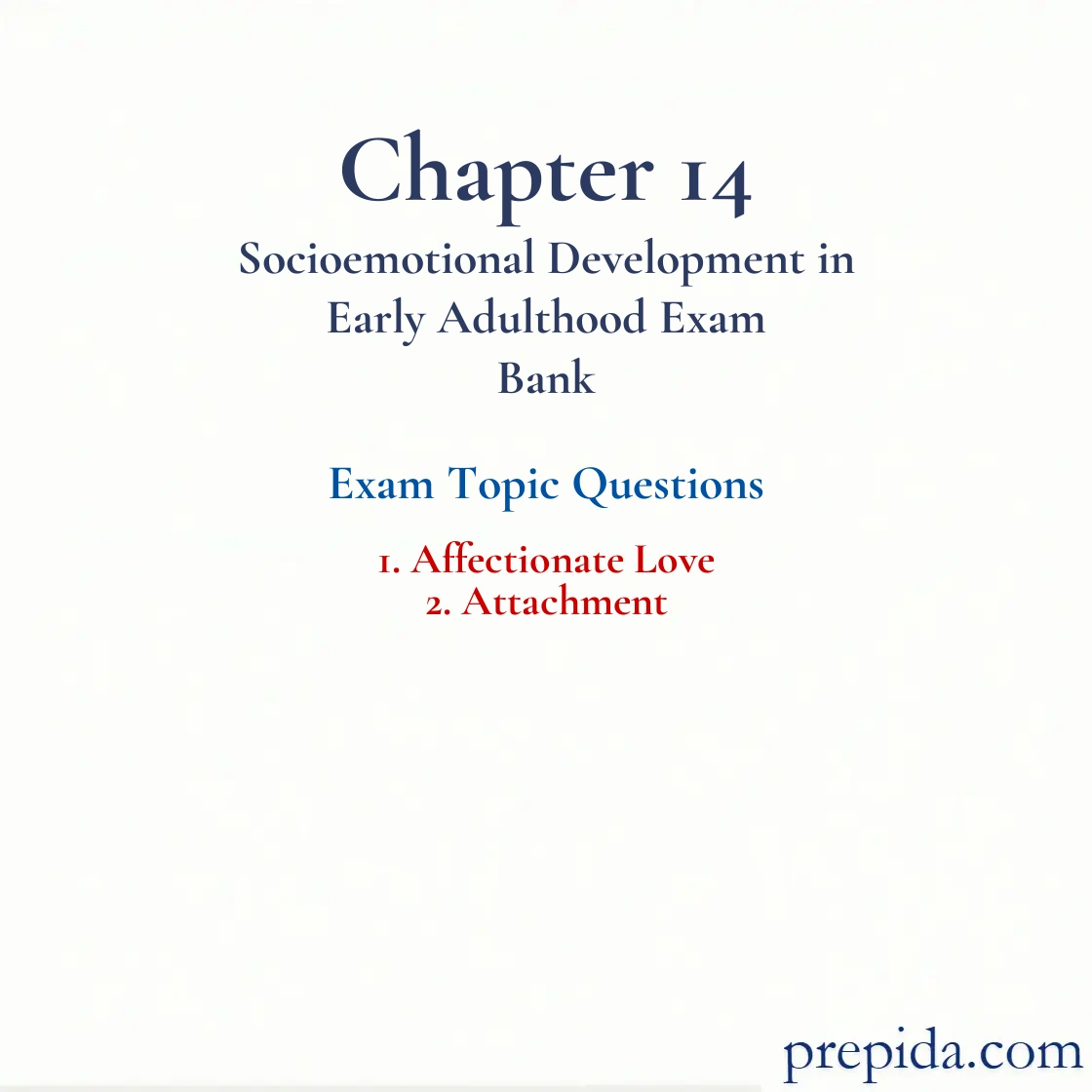
Penelope is describing her marriage of 15 years: "My husband and I were eating breakfast the other day. Neither of us was talking, both of us just reading and thinking our own thoughts. But it was a very comfortable, companionable silence, and I loved it!" What aspect of their relationship does this illustrate?
- passion
- infatuation
- romantic love
- affectionate love
Affectionate Love: In this type of love, also called companionate love, an individual desires to have the other person near and has a deep, caring affection for the other person.
________ love is the type of love that occurs when someone desires to have the other person near and has a deep, caring affection for the person.
- Passionate
- Fatuous
- Companionate
- Romantic
Affectionate Love: In this type of love, also called companionate love, an individual desires to have the other person near and has a deep, caring affection for the other person.
After 3 years of being in an intimate relationship with her boyfriend, Susan realizes that although she still feels passion for her boyfriend, she now desires to simply have him close to her. She cares for him a lot and has deep feelings for him. In this scenario, Susan is most likely experiencing
- passionate love.
- affectionate love.
- fatuous love.
- romantic love.
Affectionate Love: In this type of love, also called companionate love, an individual desires to have the other person near and has a deep, caring affection for the other person.
Tina and Danny have been married for 12 years. Both are working and have busy schedules, but at the end of the day, they sit together and tell each other about their day. They have had their share of ups and downs in life, and their love for each other has grown steadily. However, Tina, although very happy in her marriage, reminisces about and wishes to have the passion they had in the early days of their marriage. According to Robert J. Sternberg's triarchic theory of love, Tina and Danny's relationship is mostly likely categorized as
- romantic love.
- consummate love.
- affectionate love.
- fatuous love.
On an assessment of attachment styles modeled on Hazan and Shaver's questionnaire, Alicia described herself thus: "I find it relatively easy to get close to others and I am comfortable depending on them and having them depend on me. I don't worry about being abandoned or about someone getting too close to me." Alicia seems to have a(n) ________ attachment style.
- avoidant
- secure
- anxious
- gregarious
Attachment: A close emotional bond between two people.
In the context of adult attachment styles, attachment-anxious individuals are characterized by
- an overall higher level of satisfaction in close relationships than their securely attached counterparts.
- a need to distance themselves from their partner.
- higher negative affect and perceived social rejection than their securely attached counterparts.
- a well-integrated sense of self-acceptance, self-esteem, and self-efficacy.
Anxious Attachment Style: An attachment style that describes adults who demand closeness, are less trusting, and are more emotional, jealous, and possessive.
According to Mario Mikulincer and Phillip Shaver, when adults who are ________ face stress and adversity, they activate cognitive representations of security, are mindful of what is happening around them, and mobilize effective coping strategies.
- avoidant
- securely detached
- insecurely attached
- securely attached
Securely Attached Babies: Babies who use the caregiver as a secure base from which to explore the environment.
According to Mario Mikulincer and Phillip Shaver, ________ individuals have the ability to control their emotions, are optimistic, and are resilient.
- avoidant
- securely attached
- insecurely attached
- anxious-ambivalent
Securely Attached Babies: Babies who use the caregiver as a secure base from which to explore the environment.
According to recent studies, which of the following adults had higher levels of sexual satisfaction?
- attachment-secure adults
- attachment-avoidant adults
- attachment-anxious adults
- attachment-disorganized adults
Attachment: A close emotional bond between two people.
According to recent studies, which of the following individuals showed lower levels of depressive symptoms?
- attachment-anxious adults
- attachment-secure adults
- attachment-avoidant adults
- attachment-repellant adults
Attachment: A close emotional bond between two people.
A national survey indicated that ________ in adults was associated with the development of disease and chronic illness, especially cardiovascular system problems such as high blood pressure, heart attack, and stroke.
- secure attachment
- easy temperament
- insecure attachment
- assertive personality
Secure Attachment Style: An attachment style that describes adults who have positive views of relationships, find it easy to get close to others, and are not overly concerned or stressed out about their romantic relationships.
Recent studies confirmed that ________ individuals showed strong ambivalence toward a romantic partner.
- attachment-anxious
- securely attached
- attachment-avoidant
- attachment-disorganized
Maria recently got married. In the context of adult attachment styles, she is more likely to engage in infidelity if she or her partner has a
- highly anxious attachment style.
- highly avoidant attachment style.
- secure attachment style.
- disorganized attachment style.
Anxious Attachment Style: An attachment style that describes adults who demand closeness, are less trusting, and are more emotional, jealous, and possessive.
The ________ attachment style is more likely to be characterized by trust, commitment, and longevity.
- disorganized
- avoidant
- anxious
- secure
Which of the following is true of the preferences of adults regarding the attachment styles of their partners?
- Securely attached adults show a preference for individuals with an anxious attachment style.
- Individuals with an anxious attachment style mostly seem to prefer a partner with an anxious attachment style.
- Adults prefer to have an avoidant adult as a partner.
- Adults prefer having a securely attached partner.